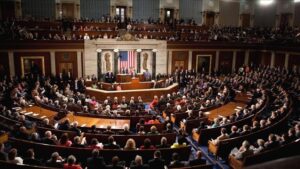When US Steel accepted a buyout offer from Japan’s Nippon Steel last year – dodging a lower offer from domestic rival Cleveland-Cliffs – Wall Street rejoiced.
Washington, on the other hand? It grimaced.
And so, nine months of K Street lobbying, labour union wrangling, and (yes) voter polling later, news has emerged this week that the White House now plans to block the deal on national security grounds.
Stay on top of your world from inside your inbox.
Subscribe for free today and receive way much more insights.
Trusted by 134,000+ subscribers
No spam. No noise. Unsubscribe any time.
But first, some backstory…
Founded in 1901, US Steel is as American as, well, US Steel. It supplied metal for the Empire State Building, pioneered workplace safety rules like hard hats, and even got name-dropped in The Godfather II!
It was the world’s largest company for a time, but these days it isn’t even the largest steel company. In fact, it’s the world’s 24th largest steel company, at the tail end of a list that’s long since been dominated by China’s industry.
Washington has tried to stem the bleeding over recent years by —
- Imposing a 25% tariff on most steel imports (Trump)
- Renegotiating certain steel quota arrangements (Biden), and
- Giving local steelmakers a boost via industrial policy (Biden).
And sure, the sector has welcomed the help, but CEO David B Burritt says a takeover from Nippon Steel (the world’s 4th largest producer) would do something bigger: turn the firm back into a “truly global steel company”.
Not so fast.
Biden, Harris, and Trump all want US Steel to remain US-owned, and there’s been a bipartisan push for the powerful (if mysterious) Committee on Foreign Investment (CFIUS) to investigate the deal on national security grounds.
CFIUS has been around for half a century, but US presidents have only blocked eight deals on CFIUS grounds. Seven of the eight have involved deals originating from China. And the most recent one (from May) involved a China-owned crypto-miner buying land right next to a US nuclear base in Wyoming!
But here we are now talking about a steel deal, with amajor US ally (Japan), and America’s top foreign investor, which already owns another Pennsylvania steelmaker (Standard). So then… why not let it own another?
There are a couple of factors at play here. First, sure, steel often pops up in national security discussions because of (for example) its core military, energy, and infrastructure uses.
But second, the United Steelworkers union has long opposed the deal, worried about “good jobs, benefits and retirement plans.”
And United isn’t any old union: it’s the largest industry union in North America (1.2 million members). And it’s headquartered in Pennsylvania, which isn’t any old state – it’s a key swing state along any candidate’s path to the White House.
So how’s everyone reacting to a possible blocking?
- CFIUS still isn’t commenting, and apparently hasn’t even made a recommendation to the White House yet
- Some US Steel workers have just held a rally in support of the sale, and the company’s CEO is warning of more plant closures if the sale fails, and
- The markets seem to agree – US Steel shares have plunged 20% this week, and 40% since opposition to the deal first emerged.
As for Japan? It’s stayed silent in public, though a contender to be Japan’s next prime minister this month (cabinet minister Taro Kono) just said the quiet bit out loud: “everyone wants the votes of labour unions in the presidential election, but I hope that the market will not be distorted by such things”.
INTRIGUE’S TAKE
Sure, Japan has stayed silent in public, but it’s been busy behind the scenes. We’ve been hearing it for months, and it’s now there for all to see: soon after opposition to this deal first emerged, Nippon Steel hired one of DC’s top lobbying firms, US Steel hired another, and the Embassy of Japan added a few more to its own roster. And to be clear, lots of countries do this. The top spenders are the Saudis, but even tiny Palau gets amongst it.
Still, it’s interesting that all the lobbyists in Washington – plus some of the arguments we’ve outlined above – don’t seem to be enough to outweigh a few thousand crucial votes in Pennsylvania during an election year.
And that raises some more intriguing questions:
- Are we seeing a change in the role of CFIUS?
- Are we seeing a change in US openness to foreign investment?
All we’d say is that, first, what we’re seeing is an election year. Second, this political process is coinciding with a geopolitical one. And third, any big business not watching both processes very closely might be in for a shock.
Also worth noting:
- Nippon Steel has argued the deal will “enhance American national security”and has pledged to keep US Steel headquartered in Pennsylvania.
- The US department of justice reportedly also opened an antitrust investigation into the Nippon-US Steel deal in April.









